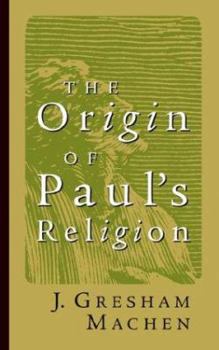Origin of Paul's Religion
Select Format
Select Condition 
Book Overview
J. Gresham Machen's fascinating account of the Apostle Paul explains and sheds light on the religious beliefs of the titular subject, which remain an important component of Biblical theology. Paul was... This description may be from another edition of this product.
Format:Paperback
Language:English
ISBN:080281123X
ISBN13:9780802811233
Release Date:June 1947
Publisher:William B. Eerdmans Publishing Company
Length:340 Pages
Weight:0.80 lbs.
Dimensions:0.8" x 5.1" x 8.2"
Customer Reviews
3 ratings
Helpful
Published by Thriftbooks.com User , 15 years ago
I used it in my Pauline letter class in seminary. It helped me to understand things better.
Even Bultmann was amazed
Published by Thriftbooks.com User , 19 years ago
I have never seen a secondary source reference to this, but years ago I read an English translation of Bultmann's German review of this Machen book. Bultmann generally ignored works written in English, especially by Americans, and he despised the theology that people like Machen stood for. And yet he gave a long review where he acknowledged this to be the best book of its kind to appear thus far. Extremely insightful and thorough. And the balanced and fair tone will surprise those unfamiliar with Machen's more scholarly writings. A real classi c still well worth reading.
Among the Best Books I've Read
Published by Thriftbooks.com User , 22 years ago
This book represents an exhaustive and outstanding treatise in Pauline studies by J. Gresham Machen. Even after the better part of a century after these lectures were given, the book represents a monumental feat and is still one of the best studies of Paul in print.Machen's lectures that are presented in this book were given at a time when Biblical criticism that rejected supernaturalism, Bible inspiration, and Biblical historicity was in full blossom. Many competing schemes had been developed to naturalize the musings of the Apostle Paul and to separate the Pauline epistles in every possible way from the alleged 'historical Jesus' of the naturalistic scholarship fad that prevailed in Biblical criticism at that time. This book represents a comprehensive rebuttal to many of these theories. Machen's critiques are complete; and they are devastating. By so thoroughly destroying the naturalistic theories that were forced onto Christianity in an effort to discredit it, Machen not only discredits these theories, he strongly affirms the orthodox tenets of the historic Christian faith in a very scholarly manner.Machen, with relentless logic, systematically tackles several main thrusts of criticism and finds each of them wanting to the extreme. In the process, Machen discredits efforts to separate the religion of Paul from the religion of Peter, and thereby discrediting the view that the Christianity of Jerusalem and the Christianity of the dispersion were somehow different. This section was simply masterful, in my opinion. Machen then discredits theories that tried to contrast Paul and Jesus. These theories suggested that the Jesus of Paulinism was different than the real Jesus of Palestine. Again, Machen is relentless in discrediting this argument. Machen moves on to perhaps his best section, which is discussing the alleged pagan influences and/or origins of Paul's thought. Two complete chapters, and a portion of a third, are devoted to tackling this subject. In the process, the theories of Bousset, Bruckner, Reitzenstein and others are demonstrated to be an embarassment. Machen's treatment of the pagan influence issue here was probably the most resounding rebuke written until Nash's 'Gospel and the Greeks' was written in the late '80s. At a number of points, Nash draws significantly from Machen here, and put together, the two works represent a devastating case against pagan influences upon early Christianity.Throughout this book, I was simply amazed at how thorough Machen was in considering so many objections and nuances that impact on the central question of the origin of Paulinism. I was also amazed that even though these lectures were given so long ago, they are extraordinarily relevant today. Yesterday's Boussets, Bruckners, and Reitzensteins are today's Crossans, Funks, and Borgs. The arguments are strikingly similar, and fueled by similar motivations - ie: to find a way to desupernaturalize Jesus Christ, the words of the Bible, and the Christian





